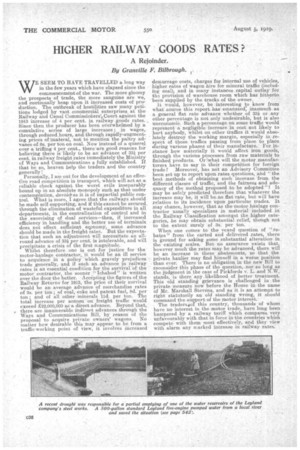HIGHER RAILWAY GOODS RATES?
Page 14

If you've noticed an error in this article please click here to report it so we can fix it.
A Rejoinder.
By Granville F. Bilbrough. 1, WE SEEM TO HAVE TRAVELLED a long way in the few years which have elapsed since the commencement of the war. The more gloomy the prospects of trade, the nore sanguine are we, and continually heap upon it increased costs of production. The outbreak of hostilities saw many petitions lodged by vast commercial enterprises at the Railway and Canal Commissioners' ,,Court against the 1913 increase of 4 per cent. in railway goods rates. Since then the producer has been overwhelmed by a cumulative series of large increases ; in wages, through reduced hours, and,through rapidly-augmenting prices of ',..materal, not to mention the paltry advance of 6s. per ton on coal. Now instead of a quarrel over a trifling 4 per cent., there are good reasons for i believing there s likely to be an advance of 331 per cent. in railway freight rates immediately the Ministry of Ways and Communications s fully established. If that be so, heaven help the traders and the country generally ! Personally, I am out for the development of an effective road competition in transport, which will a-ct as a, reliable check against the worst evils inseparably bound up in an absolute monopoly such as that under contemplation, devaidfas it is of impartial public control. What is more, I agree that the railways should be made self-supporting, and if this cannot be secured. through the 'elimination of wasteful expenditure in all departments, in the centralization of control and in the exorcising of dual services—then, if increased efficiency in handling and the better use of terminals does not effect sufficient economy, some advance should be made in the freight rates. But the expectation that such an adjustment will necessitate an allround advance of 33i,_per cent. is intolerable, and will precipitate a.. crisis of the first magnitude.
Whilst therefore one is out for justice for the motor-haulage contractor,,it would be an all service
to acquiesce in a policy which gravely i prejudices i trade generally,and if 'such an ,advance n railway rates s an essential condition for the survival of the motor contractor, the sooner " Ichabod" is written over the door the better, Accepting the figures of the Railway Returns for 1913, the price of their Survival would be an average advance of merchandise rates of 3s. per ton; of coal, coke and patent fuel, 8d. per ton ; and of all other minerals Ild. per ton. The total increase per annum on freight traffic would exceed £22,000,000 as a direct advance. Beyond that,
. there are innumerable indirect advances through the Ways and Communications Bill, by reason of the proposal to acquire private owners' wagons. No matter how desirable this may appear to be from a traffic-working point of view, it involves increased demurrage costs, charges for internal use of vehicles, higher rates of wagon hire for mineral traffic (includ
ing coal)2 and in many instances capital outlay for the provision of warehouse room which has hitherto been 'supplied by the trucks of the owner.
It would, however, be interesting to know from what source this report has emanated: inasmuch as a general flat rate advance whether of 33A• or any other percentage is not only undesirable, but is also uneconomic. Such a percentage on some traffic would represent a negligible increase in cost not likely to hurt any-body, whilst on other traffics it would absolutely destroy the working margin, especially in „re spect of those traffics passing from place to place during various phases of their manufacture. For instance how materially it would affect iron goods, through the various processes from raw materials to finished products. Or 'what will the motor manufacturers have to say in their competition for foreign trade ? Moreover, has mit an Advisory Committee been. set up to report upon rates questions, and " the best methods of obtaining such increase from the different classes of traffic, and the fairness and ade quacy of the method proposed to be adopted" I It may be safely predicted therefore that whatever the increase may be, it will be-no flat rate, but will have relation to its incidence upon particular trades. It may chance, however, that as the motor haulage con tractor usually specializes in material included in' the Railway Cla,ssific,ation amongst the higher categories, he may obtain substantial relief, though not to the extent surely of 3s. per ton.
When one comes to the vexed question of " rebaes " from the carted and delivered -rates, there is ground for asking some substantial alteration in the existing scales. But no assurance exists that, however much the rates may be advanced, there will be an increase in these abatements, so that the private haulier may find himself in a worse position than ever: There is no obligation in the new Bill to reconsider this phase of the question, nor so long as the judgment in the case of Pickfords v. L. and N.W. stands, is there any likelihood of better treatment. This old standing grievance is challenged in the private measure now 'before the House in the name of Mr. Marshall Stevens, and as it is an attempt to right statutorily an old standing wrong, it should command the support-of the motor intereSt. The tradera*of this country, thousands of whom have no interest in the motor trade, have long been hampered by a railway tariff which compares very unfavourably with that in force in the countries which compete with them most effectively, and they view with alarm any marked increase in railway rates.






















